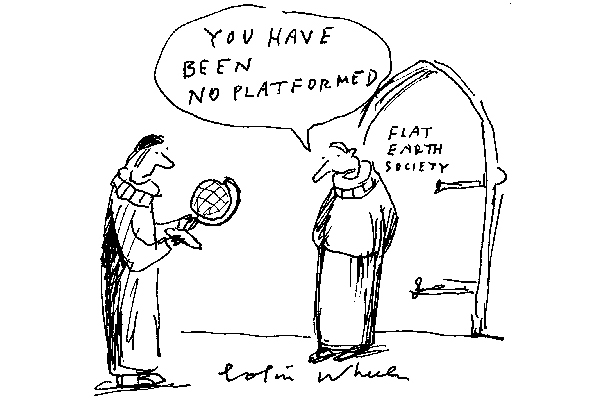By Anna Tsekani,
Throughout the passage of the years, people are debating millions of different aspects, topics, and beliefs. Scientists had never imagined that after the discoveries about the sphericity of the Earth, they would come to this point debating and analyzing if the earth is flat. The Flat Earth movement is becoming day by day a topic of increasingly wide appeal.
The Flat Earth movement appears to be the result of a mix of Biblical literalism and conspiracy theorizing. Conversations with participants at the first International Flat Earth Conference in 2017 revealed that the majority of Flat Earthers have only recently come to support Flat Earth ideas after watching YouTube videos. However, because the movement is new, there is a scarcity of literature on this group, including what exactly convinced these new Flat Earthers and how their conversion occurred.

Modern Flat Earth ideology can be traced back to 1849 in England when a religious fundamentalist named Samuel Rowbotham introduced “Zetetic Astronomy”. Rowbotham claimed that the Earth was the center of the universe and that only the use of one’s senses, or a strict form of empiricism, was a reliable method of attaining truth. These ideas later became the subject of his 1873 book Earth Not a Globe. Rowbotham was able to gather a small following, and the first “Universal Zetetic Society” eventually made its way to the United States, where the International Flat Earth Research Society of America was founded in California in 1971. This group eventually evolved into the Flat Earth Society.
The term “flat Earth” first appeared on YouTube in 2011, but mostly in the context of using Flat Earth ideology as a standard of ridiculousness. The first YouTube videos containing arguments in favor of a flat Earth did not appear until 2014. Only three years later, Flat Eartherism had grown into a full-fledged movement with international conferences. What could be causing an increasing number of people to latch onto such a bizarre claim?
Through a combination of YouTube videos and conspiracy theory chatrooms, the antiquated idea that the Earth is flat has been reborn as a modern movement. As evidence for the “truth” of its claims, the “Flat Earth” movement invokes both conspiracy theories and Biblical literalism. Interviews with participants at the first International Flat Earth Conference in 2017 revealed that the majority of Flat Earthers have only recently come to support Flat Earth ideas after watching YouTube videos purporting to demonstrate that the Earth is not a spinning ball.
There appear to be existential, epistemic, and social reasons that drive people to conspiratorial belief, and in a seemingly chaotic post-truth world where loneliness has become a major health concern, are we really surprised that these untruths are thriving?
Research has shown that people are generally motivated to keep their attitudes, values, and beliefs consistent. When this consistency is threatened by new information that contradicts one’s previously held beliefs, cognitive dissonance occurs. This manifests as a sense of cognitive discomfort, which motivates people to seek relief. The motivated reasoning theory may appeal useful in understanding the psychology under the flat earthers.
Motivated reasoning ensures that Flat Earther experiences as little negative emotion as possible without having to go through the mental anguish of discovering the actual truth.
Kunda’s (1990) case for motivated reasoning describes the subsequent process of discomfort alleviation: when confronted with contradictory information, one denies, trivializes, or makes it conform to prior conclusions. However, when information is consistent with one’s prior beliefs, it is often quickly accepted. According to some researchers, conspiracy thinking is a type of motivated reasoning in which people subscribe to ideologically motivated conspiracies in order to protect their worldviews.
Conspiracy mentality (or conspiracy ideation) is a political worldview dominated by emotions such as paranoia, cynicism, and powerlessness, accompanied by a high distrust of people in positions of power and government institutions. Flat Earthers have been shown to have higher levels of conspiracy ideation than the general population, and they have described watching other conspiracy videos on YouTube before seeing videos about Flat Earth in their recommended videos feed.

More specifically, this is a type of reasoning that is motivated by the desire to reach a conclusion that corresponds to our pre-existing beliefs, resulting in feel-good positive emotions. When our beliefs are challenged, we feel an unpleasant, almost jarring sensation known as cognitive dissonance — our confidence in the topic has been called into question, and we have a strong desire to get rid of the unpleasant feeling. There are two ways to overcome cognitive dissonance: replace our current idea with the new one being proposed, or reject it completely. It is obvious which is easier — rejection requires no cognitive effort, whereas replacing the idea with something new requires us to search our memories for related information and consider its logicality. We will probably reject the idea based on the principle of least effort. Some Flat Earthers are so firm in their beliefs, with such a false sense of objectivity, that they may never even reach cognitive dissonance, dismissing evidence before it has a chance to rear its head.
Another psychological phenomenon known as confirmation bias supports this theory. It explains our tendency to actively seek information that confirms our pre-existing beliefs while ignoring information that contradicts them. Contrary evidence, which is just as visible as everything else, fades into the background. Though we may enjoy the occasional flirtation with an opposing idea, we prefer to be correct about our deeply held beliefs because it boosts our confidence and sense of certainty.
References
-
Olshansky, A., Peaslee, R. M., & Landrum, A. R. (2020). Flat-smacked! Converting to flat eartherism. Journal of media and religion, 19(2), 46-59
-
Elfy Scott, Why people believe the Earth is flat and we should listen to anti-vaxxers, theguardian.com. Available here
-
Antidotes for Chimps, The Psychology of Flat Earthers and why they refuse to see the truth. antidotesforchimps.com. Available here




